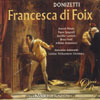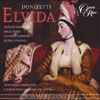Donizetti Francesca di Foix
Two Donizetti delights restored
View record and artist detailsRecord and Artist Details
Composer or Director: Gaetano Donizetti
Genre:
Opera
Label: Opera Rara
Magazine Review Date: 6/2005
Media Format: CD or Download
Media Runtime: 76
Mastering:
Stereo
DDD
Catalogue Number: ORC28

Tracks:
| Composition | Artist Credit |
|---|---|
| Francesca di Foix |
Gaetano Donizetti, Composer
Alfonso Antoniozzi, The Count, Bass-baritone Annick Massis, The Countess, Francesca di Foix, Soprano Antonello Allemandi, Conductor Bruce Ford, The Duke, Tenor Gaetano Donizetti, Composer Geoffrey Mitchell Choir Jennifer Larmore, The Page, Edmondo, Mezzo soprano London Philharmonic Orchestra Pietro Spagnoli, The King, Baritone |
Composer or Director: Gaetano Donizetti
Genre:
Opera
Label: Opera Rara
Magazine Review Date: 6/2005
Media Format: CD or Download
Media Runtime: 66
Mastering:
Stereo
DDD
Catalogue Number: ORCD29

Tracks:
| Composition | Artist Credit |
|---|---|
| Elvida |
Gaetano Donizetti, Composer
Anne-Marie Gibbons, Zulma, Mezzo soprano Annick Massis, Elvida, Soprano Antonello Allemandi, Conductor Ashley Catling, Ramiro, Tenor Bruce Ford, Alfonso, Tenor Gaetano Donizetti, Composer Geoffrey Mitchell Choir Jennifer Larmore, Zeidar, Mezzo soprano London Philharmonic Orchestra Pietro Spagnoli, Amur, Baritone |
Author: John Steane
Francesca di Foix dates from 1831, shortly after Donizetti’s great success with Anna Bolena. Designated ‘melodramma giocoso’, it tells of an amusing episode at Court, where arrangements are made to welcome a lovely young Countess whom her mean old husband normally keeps at home more or less under lock and key. The libretto is deftly woven and the music is fresh and high-spirited. As Jeremy Commons says in his introductory essay, it is ‘a witty and often wry little satirical comedy… a quirky odd-man-out in Donizetti’s output’.
Elvida is earlier (1826), more serious and less worth taking seriously. Its story crams the action of a full-length opera into three short scenes. A more mature composer might have identified his characters with music that was uniquely theirs rather than merely fitting them up as character-types. And yet there is much to enjoy. Again, Dr Commons points helpfully, in this case, to a trio near the end of the opera as ‘the jewel in the crown’. Personally, my feelings turn towards admiration even at moments when Donizetti makes us smile and tap our feet while the librettist is urging us to cower in horror at the likely fate of the noble heroine and her manly lover. It was once considered facile (in a pejorative sense) to have such a ready supply of melodies at hand; today, when the supply seems to have dried up completely, this is a complaint we are perhaps less likely to make.
The operas, though boxed separately, are well-paired. Each was written for a royal occasion, which meant that nobody paid them much attention. As little one-acters they got lost after four performances (Elvida) or seven (Francesca). They were also written for star singers (Lablache and Rubini in 1826, Tamburini in 1831) whose special needs had to be high among the composer’s priorities, and that meant plenty of florid writing and ornamentation. It says much for the present singers that they can take on, and deal so successfully with, the vocal challenges of both operas.
The limpid purity of Annick Massis’s voice, it’s true, is better suited to the lighter manner of Francesca than to the heroic, death-defying Elvida, but she deals remarkably well with the technical difficulties of both. Bruce Ford does more than merely cope with the fearsome tessitura of the tenor roles, singing with elegance as the Duke in Francesca and adding robustness of tone and declamation for the Castilian warrior of Elvida. Pietro Spagnoli is the interesting baritone, probably a bit high for the King and not quite sonorous enough for the Moor, but well-defined and skillful in his fioritura. And the fourth in the quartet is Jennifer Larmore, a distinguished member of the casts who has also the distinction of playing the one ‘real’ character in Elvida, the dutiful son who opposes his father, and the sincere lover who renounces his beloved. Antonello Allemandi conducts effectively, the LPO play splendidly, and all the elements are well balanced by producer and engineers.
Discover the world's largest classical music catalogue with Presto Music.

Gramophone Digital Club
- Digital Edition
- Digital Archive
- Reviews Database
- Full website access
From £8.75 / month
Subscribe
Gramophone Full Club
- Print Edition
- Digital Edition
- Digital Archive
- Reviews Database
- Full website access
From £11.00 / month
Subscribe
If you are a library, university or other organisation that would be interested in an institutional subscription to Gramophone please click here for further information.




